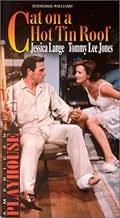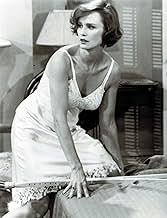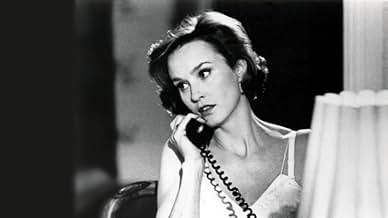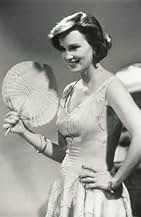An alcoholic and femme fatale face troubles before a family reunion.An alcoholic and femme fatale face troubles before a family reunion.An alcoholic and femme fatale face troubles before a family reunion.
- Won 1 Primetime Emmy
- 1 win & 7 nominations total
- Director
- Writer
- All cast & crew
- Production, box office & more at IMDbPro
Featured reviews
I have an extraordinary attachment to this play. Aside from being my all-time favorite, which I have read at least fifty times, I was also cast as Big Daddy for an attempted high school production, which, fittingly enough for the history of the play, I suppose, was cancelled and replaced with something "more appropriate" under pressure from the school's administration. I saw the original Newman-Taylor version after reading it the first few times, but had heard a lot of raving that the 1958 film was horrible and that this was worlds better. I found a laser-disc copy and watched it this afternoon. I definitely have more complaints with this performance than I expected. I personally wish that the Rip Torn of 'The Insider' and 'Wonder Boys' had been present in the role of Big Daddy, rather than the version I saw, who despite playing the role with an enormous passion, produced a performance which saw his accent slide all over the place, from a few moments of European immigrant on one misguided extreme to Chris Kattan's incomprehensible sketches on SNL at another, the original lines by Tennessee Williams often escape him, and overall, it results in a very streaky and inconsistent characterization. Perhaps this is a result of being filmed live, or perhaps it's a Rip Torn without an additional fifteen years of experience. Jessica Lange also turned in an impassioned role, but she also seemed rather inconsistent. I actually longed for a little of Liz Taylor's cattiness in the first act, but the play as a whole I preferred Lange. My only quibble with Tommy Lee Jones was that he did not seem to make a decision whether Brick was indeed homosexual or not, which I think is important, because the issue of homosexuality, although the most controversial aspect, is not so crucial to the play as the issues of mendacity dissolving his friendship with Skipper. The two are interrelated, but while the belief that Skipper was homosexual would cause him to question his own sexuality, there were times when Jones seemed to actually believe the allegations, moreso than I would have expected from the character. Gooper, Mae, and Big Mama all were the finest I've seen those roles played. The other complaint was with some of the production values. I was glad that it was done realistically rather than expressionistically as Kazan first directed it on Broadway, but the liquor cabinet and bed are supposed to both have an awesome presence on the room, and neither does in this film, nor does the bedroom have the quality of "pale light on weathered wood" Williams specified in the production notes. Also, Big Daddy's entrance in a baseball cap seemed entirely out of place. Worst, however, was the soft-focus quality of the camera. There are some questionable directorial decisions, things I think could have been staged better, but the essence of the play shines through, and most importantly, the third act is nearly flawless. The passionate conflicts that Williams weaves together are communicated, and the play is so good that nearly any group, probably even my little high school troupe, could have moved an audience, even if not displaying master craft.
Wonderfully acted stage production of Williams' classic play. This first aired on Showtime in 1984 or 1985 and I can still recall being a small boy absolutely loving this. Lange is so fiery (and even humorous) in her role as Maggie and Jones is so full of emotional and physical pain as Brick. The other performances are just as solid. Beautiful set designs and nice southern music add on to the positive elements of this great drama.
Just as Stanley Kowalski and Blache du Bois will be forever associated with Marlon Brando and Vivien Leigh, so too will Brick and Maggie be with Paul Newman and Elizabeth Taylor. These are performances that define the meaning of definitive which of course poses an insurmountable problem for anyone attempting to recreate those roles. One has to approach a revival of "Streetcar" or "Cat" with the foreknowledge that the principals will more than likely fall short. It's more a question of just how short.
Jessica Lange falls shorter than one might expect although not for want of trying. That in fact is the major problem with her performance. One is constantly aware of just how hard she's trying. There's far too little cat in her "Maggie the Cat". In a bit of misdirection she takes to using her hands to make cat like movements. The result is ungainly and fails to compensate.
As Brick, Tommy Lee Jones' limitations have never been more evident. It's impossible to believe that he has any real sexual ambivalence which is the very heart of the character. His speeches concerning his buddy Skipper have no emotional truth whatsoever. It is a heartless performance. I saw Brendan Fraser battle with the part on the stage. He failed to make it work, but fared far better than Jones.
Burl Ives' marvelous portrayal of Big Daddy is too a definitive one. From Rip Torn, an actor with a wealth of experience one certainly could have expected a lot more. For some reason he is presented as scruffy and unkempt. This is hardly the imposing figure that Williams intended, one that commands respect and flaunts his power as head of the family. But worse still was his way over the top acting. Like Jones, he too lacked any sense of inner truth.
Before touching on the one redeeming feature of this production a word must be mentioned about the Southern accents used. I don't profess to have a deep knowledge as to the accuracy of the ones on display here. But I do know that from the first line to the last one is constantly aware of these accents. They seem to be greatly exaggerated and rather than lend a certain Southern charm they soon begin to grate on the nerves. They simply do not come off as natural and hamper what is already a very problematic production.
And finally, Kim Stanley. While Lange, Jones and Torn never stop acting for a minute, Kim Stanley simply is Big Mama. And that, of course, is what separates the men from the boys. Judith Anderson was superb in the screen version and yet Stanley manages to recreate the character as her own. While the other actors present caricatures, she becomes a real person before our eyes. There is precious little on film of Kim Stanley's performances which is, in the final analysis, the only worthwhile reason for seeking out this version.
Jessica Lange falls shorter than one might expect although not for want of trying. That in fact is the major problem with her performance. One is constantly aware of just how hard she's trying. There's far too little cat in her "Maggie the Cat". In a bit of misdirection she takes to using her hands to make cat like movements. The result is ungainly and fails to compensate.
As Brick, Tommy Lee Jones' limitations have never been more evident. It's impossible to believe that he has any real sexual ambivalence which is the very heart of the character. His speeches concerning his buddy Skipper have no emotional truth whatsoever. It is a heartless performance. I saw Brendan Fraser battle with the part on the stage. He failed to make it work, but fared far better than Jones.
Burl Ives' marvelous portrayal of Big Daddy is too a definitive one. From Rip Torn, an actor with a wealth of experience one certainly could have expected a lot more. For some reason he is presented as scruffy and unkempt. This is hardly the imposing figure that Williams intended, one that commands respect and flaunts his power as head of the family. But worse still was his way over the top acting. Like Jones, he too lacked any sense of inner truth.
Before touching on the one redeeming feature of this production a word must be mentioned about the Southern accents used. I don't profess to have a deep knowledge as to the accuracy of the ones on display here. But I do know that from the first line to the last one is constantly aware of these accents. They seem to be greatly exaggerated and rather than lend a certain Southern charm they soon begin to grate on the nerves. They simply do not come off as natural and hamper what is already a very problematic production.
And finally, Kim Stanley. While Lange, Jones and Torn never stop acting for a minute, Kim Stanley simply is Big Mama. And that, of course, is what separates the men from the boys. Judith Anderson was superb in the screen version and yet Stanley manages to recreate the character as her own. While the other actors present caricatures, she becomes a real person before our eyes. There is precious little on film of Kim Stanley's performances which is, in the final analysis, the only worthwhile reason for seeking out this version.
When I watched Maggie/Jessica Lange do that long all-in-one-breath monologue telling Brick how everybody loved him, I said to myself This has got to be the high point in American Theater. It was one great sustained crescendo. It is most incredible that it goes unnoticed.
10jhb-4
Hello from Joe Bonelli-- a native Mississippian and actor who performs as Tennessee Williams in a one-man show (not an "impersonator" gig). The one-star review of this "Cat on a Hot Tin Roof" by a know-nothing here states that maybe that person doesn't understand or appreciate "over the top southern drama." You got it!! This version of the original Williams script, butchered by Hollywood in 1958-- good film, but NOT "Cat"-- is dead on. Tommy Lee Jones, a Texas native, is, in this version, the best Brick I've ever seen. This part is probably the most difficult male role in the Williams' canon and Tommy Lee pulls it off admirably. I like Jessical Lange very much but do not consider her quite right for this, for Blanche in "Streetcar" (which she also plays in a version that doesn't really work well) or Amanda in "Glass Menagerie" (which she is to play on Broadway in early 2005). Rip Torn and the late, lamented Kim Stanley are excellent in their roles and Williams-- who admired both immensely-- would, I believe, have approved. Now don't get me wrong-- there are some fine aspects to the Hollywood film and good performances all around (especially from the brilliant Burl Ives, recreating his Broadway original, and Madeline Sherwood as Sister Woman (Mae)-- ditto!) But the constraints of the Hollywood Production Code really hurt what could have been a true classic. By the way, Williams appreciated the performances of both Elizabeth Taylor and Paul Newman in the Hollywood bowdlerized version-- as do I. It would have been wonderful to see how these great stars/actors would have handled the original script. I suggest that the writer who doesn't "understand or appreciate over-the-top southern drama" stick to prettily-cast sanitized Hollywood adaptations of great plays and true-to-the-original films of them-- and pass on handing out uninformed opinions about the real thing. You don't have to like a play or a performance-- but you DO need to know something about it before you dismiss fine writing and acting.
Did you know
- TriviaThe original play "Cat On A Hot Tin Roof" by Tennessee Williams opened at the Morosco Theater in New York on March 24, 1955, ran for 694 performances and was nominated for the 1956 Tony Award (New York City) for the Best Play. The play also won the Pulitzer Prize in Drama in 1955.
- GoofsShadow of boom mic is seen on Brick.
- ConnectionsEdited into American Playhouse: Cat on a Hot Tin Roof (1985)
Details
- Release date
- Country of origin
- Language
- Also known as
- American Playhouse: Cat on a Hot Tin Roof
- Production companies
- See more company credits at IMDbPro
Contribute to this page
Suggest an edit or add missing content































